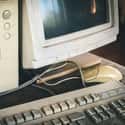-
(#1) People Thought Software Relying On Two-Digit Dates Would Suddenly Malfunction When The Date Changed To '00'
While many theories were promulgated about the impending end of the world, the most salient concerned the “Millennium Bug,” which would theoretically devastate all computers when the clock struck midnight on January 1, 2000.
For the first 40 years or so of computer programming, years were typically denoted with two digits - 98 for 1998, 99 for 1999. This shorthand seemed logical at the time, as these programmers likely didn't expect the immense staying power of their archaic machines.
The fears surrounding the Millennium Bug were not completely unfounded. The Social Security Administration, one of the organizations that spent the most time and money preparing for the new year, uses date calculations in order to determine eligibility for benefits. To do so, the computers subtract the birthday of a potential benefit recipient from the current year. This works fine subtracting a 65-year-old’s birth year of (19)34 from 99, but the same 65-year-old would suddenly lose their eligibility when they turned -34 on New Year's Day.
The potential disaster at the Social Security Administration was just one of many examples of this fear, which only grew due to the increasingly widespread hysteria.
-
(#2) The Government Set Up A $50 Million 'Y2K Command Center'
In an abundance of caution, the US government set up a temporary Y2K command center, known as the Year 2000 Information Coordination Center (ICC). In the months preceding New Year's Day, the ICC was staffed with employees from other federal entities including FEMA, Agriculture, Commerce, the EPA, the military, and the National Weather Service, among others.
Using preexisting disaster frameworks used by these same agencies, the government took a "single point of contact" approach to solving the Millennium Bug issue, ensuring that all organizations were on the same page. In the final days before Y2K, the ICC was briefed on FEMA's Civil Disaster Response processes.
-
(#3) People Worried That Everything From Banking Software To Air Traffic Control Systems To ATMs Might Suddenly Fail At Midnight
The media and the wider public saw the reasonable concerns held by the SSA and ran with them. Suddenly, everything that was computer-operated ran the risk of malfunctioning or glitching out, temporarily or otherwise.
The possibility of hospital equipment failing weighed heavily on providers. Infusion pumps ran on timers that might forget what time it was, charts would become lost and inaccurate, and no one could receive necessary care when all of the computers shut down.
To curb the consumer impulse to take out an entire account in cash in the days leading up to Y2K, bank programmers and IT departments had to update their systems, as well.
Meanwhile, the Federal Aviation Administration had a major headache on their hands when they realized that the air traffic control computers were likely to be affected. Based on their 1999 projections, systems that had not been updated could possibly malfunction and display plane positions on a 10-second lag, leading to potentially dangerous consequences. Thanks to a budget of over $400 million dollars, four years of planning and programming, and a series of potential contingency plans, the FAA was able to secure their systems with no issue in the new millennium.
-
(#4) The Government And US Companies Spent Over $100 Billion On Becoming Y2K Compliant
While the exact numbers vary between sources, the government and major US companies spent a bare minimum of $100 billion on Y2K compliance in the latter half of the 20th century. General Motors claimed to have spent around $626 million, Exxon reported about half of that, and the federal government estimated around $8.4 billion.
These figures do not take a number of factors into consideration. The amount spent mostly went to the billable man hours paid for research, investigation, and reprogramming. The real cost includes the acquisition of new machines for those that could not be updated, major publicity and information campaigns, and whatever litigation eventually stemmed from unforeseen glitches during or after Y2K. Some economists estimated a more realistic total of $150 billion spent.
Despite this harrowing figure, many economists predicted that the updated machines and newfound importance of IT knowledge would boost the economy and create many new jobs. While the exact numbers are hard to place, it’s no coincidence that the tech industry would proliferate in the years to come.
-
(#5) President Clinton’s 'Council on Year 2000 Conversion' Determined The Biggest Risk Was Hoarding
As frightening as the Millennium Bug sounded, the long-term economic effects of hoarding were another practical fear. In a press conference, John Koskinen of the Council on Year 2000 Conversion warned the public, "We are concerned about people overreacting, if 100 million people decide to do anything differently."
FEMA took a cautious but realistic approach to the potential hoarding issue. They released their usual disaster preparedness press kit, emphasizing the importance of stocking up on supplies while warning consumers about excess. They specified that the theoretical amount of supplies needed should cover a long weekend, with the possibility of a brief power outage.
The pharmaceutical industry shared a similar fear. To prevent a shortage of important substances, Noelle-Dominique Willems of the Canadian Pharmacist's Association reminded the public that medical stockpiling would cause a shortage faster than a few days of computer downtime.
-
(#6) New Mexico Governor Bill Richardson Warned People That Storing Gasoline In Their Homes Was Far More Dangerous Than Y2K
Energy secretary and former governor of New Mexico Bill Richardson cautioned motorists against stockpiling gasoline before Y2K. There were two major issues with the idea: safety and the possibility of a shortage. In a press release published the week before New Year's Day, Richardson stated, "If you have half a tank, you're good to go. There's no need to hoard gasoline. Storing it in your house is not a good idea, way more dangerous than any 'millennium bug.'"
In addition to the obvious fire risk on a holiday known for drunkenness and fireworks, the mass purchase of gasoline would create the very shortage that consumers were afraid of. Ultimately, most appeared to heed his warning, and the gas prices and stock did not stray far from their usual numbers.
-
(#7) Airlines Scaled Back Their Flights For December 31 Following Low Ticket Sales
While the FAA had the foresight to begin dealing with the potential computer disaster years before the clock struck midnight on Y2K, consumers were still skittish about flying that evening. In preparation for the unexpected, the Transportation Department set up bases at the command centers for 10 commercial airlines, Amtrak, and major freight railways.
On any other Friday, as many as 5,000 to 7,000 aircrafts take to the sky. New Year's Eve has always been a low-demand day to fly, but logged flights were reduced as much as 25% on December 31, 1999.
-
(#8) People Prepared For The Impending Low-Techness
The typically underground prepper community had their time in the spotlight during the months leading up to Y2K - their paranoia and hyper-vigilance values briefly went mainstream. Throughout 1999, survivalist classes proliferated, and online prepper communities were built.
While stockpiling toilet paper, water, and nonperishable food was commonplace for preppers, some took it one step further and prepared for a life sans technology. In Michael Hyatt’s The Millennium Bug: How to Survive the Coming Chaos, he urged citizens to learn how to “distinguish edible plants from those that are [dangerous]... [prepare] a cow [for food]... set a broken bone, pull a tooth, and deliver a baby.” Other tips included purchasing a side arm and learning how to use it.
Some businesses and institutions also embraced the low-tech movement. Amish businesses really cleaned up, as few to none of their hardware devices required electricity. Meanwhile, a hospital in Colorado allegedly gave patients a whistle to call for the nurse in case the call buttons stopped working.
While this may have been a watershed moment for the survivalist movement, the level of mass engagement with prepper logic was widely overblown by the media - most people didn’t give Y2K prep that much thought.
-
(#9) Third-Party IT Service Companies Received A Big Boost
The world of IT was undoubtedly up and coming by the turn of the 21st century, but computer science was still considered niche information, and many experts were undervalued for their labor. Camaraderie among entire corporations and fellow IT workers alike was at an all-time high during the Y2K remediation process. Departments that previously had no contact with one another were suddenly collaborating, and information was being learned and shared at an unprecedented rate.
The social and professional gains were not the only benefit. Y2K preparation, along with the dot-com boom that ran concurrently with the Millennium Bug frenzy, was "one of the single biggest drivers for packaged software."
The telecom companies that had just purchased a massive swath of domains were now faced with the challenge of updating all their software and shifting applications onto different servers. These were venture capitalists, not programmers, so the option to buy pre-packaged software and services from third parties was an obvious solution with great mutual benefit.
-
(#10) Ultimately Everything Was Fine, But Only Because Of Everyone's Hard Work
After the unceremonious beginning of the year 2000, revelers and preppers alike awoke in a world that was practically the same as the day before. The entire Y2K fiasco quickly faded into memory and was sometimes used as a punchline about overly ambitious doomsday thinking. But was it really so overblown?
The Senate Special Committee on the Year 2000 Technology Problem was formally disbanded in February 2000. The chairman, Senator Bob Bennett of Utah, emphasized the level of hidden work that went into keeping all of the government's technological elements safe and updated as the millennium approached.
Seemingly few issues arose in the aftermath of Y2K aside from a handful of insurance and credit card issues, which were quickly resolved. While the consequences seem comparatively minor, Bennett stated that these events “are not the triggering events that would cascade into each other. [This] has always been the best case scenario."
In response to the public undermining of the committee and the ICC’s work, the Senate Special Committee report stated that across the globe, there were many issues larger than those experienced stateside.
For perspective, prison doors failed in Canada, power plants malfunctioned in Eastern Europe, dialysis machines failed in East Africa and Southeast Asia, ATMs broke down in several regions, and a whopping 15% of small businesses in France reported technology issues related to Y2K. In the grand scheme, a great deal of suffering was avoided in the US due to these organizations' diligence.
-
(#11) IT Specialists Were Finally Taken Seriously
The potential profit disaster of the Millennium Bug was the galvanizing force that frightened CIOs into deferring to their in-house IT specialists and third-party vendors alike. Up until this point, the system administrators and programmers were cogs that kept the wheels of the newly online business world turning, but now they were the only ones with the knowledge to stop a potential IT disaster in its tracks. They took full advantage.
The Millennium Bug’s threat to any company’s bottom line was greater than whatever the IT workers asked for, so they were effectively given carte blanche to take whatever action necessary. Before Y2K, updating the computer equipment seemed like an unnecessary extra cost, meaning that lots of software was already grossly outdated even prior to the Y2K fiasco. The obvious benefits resulting from the modernization before and after Y2K were monumental for the IT field.
-
(#12) The Y2K Tech Upgrades May Have Helped New York’s Computing Systems Withstand 9/11
Were it not for the Y2K preparation frenzy, New York City's technological infrastructure likely wouldn't have been able to recuperate from the events of September 11 - at least not as quickly. If the outdated and redundant systems had not been updated so recently, the transportation and telecom components of disaster relief would have never come as quickly and efficiently. This meant rerouting a whopping 42% of the MTA on the day of the disaster, as well as working around the destruction of both AT&T and Verizon's cable vaults.
New Random Displays Display All By Ranking
About This Tool
Y2K also known as the Year 2000 Problem, YK2 was originally a bug in the computer program processing date. With the advent of the new century in 2000, the Internet has just developed, and people's yearning and illusions for the new century have been infinitely enlarged. The influence of Y2K is huge, the Y2K can easily enter and attack embedded devices. If the Y2K is not resolved in time, then our lives may experience some unexpected chaos.
Have you ever heard of the Y2K before? In 1997, the Y2K soon attracted global attention. If you want to know more about Y2K, please check this page, we collected 12 items, there are some reasons why did lots of people care so much about the Y2K.
Our data comes from Ranker, If you want to participate in the ranking of items displayed on this page, please click here.












